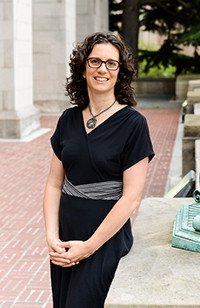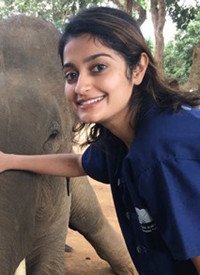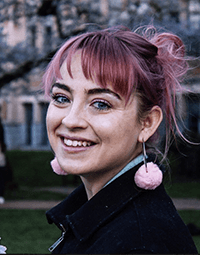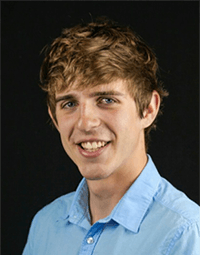Winter 2020
Published: 12/27/2019
Letter from the Chair
 |
| Cheryl Kaiser |
Greetings from UW Psychology! The arrival of winter provides an opportunity to reflect with gratitude on the many accomplishments of this year, as well as plan for the opportunities ahead of us in the coming year.
The past year has been an exciting time for our department. Our undergraduate program continues to offer outstanding opportunities to our students, in the classroom with an array of exciting new courses, and in faculty labs with hands-on-opportunities to engage in research and community outreach. Our undergraduate major is thriving, and we have record numbers of students seeking to study in Psychology. We welcomed a new cohort of graduate students this fall, and with support from our community, we were able, for the first time, to offer every student a research development quarter to take a break from their teaching assistantships and pour themselves into their studies and research. This new investment in our graduate students helped us attract the most promising students to our department. You can learn more about the incredible undergraduate and graduate student achievements in this letter.
We also welcomed two new assistant professors to our department this fall, Drs. Ariel Starr and Kate Foster. Both are building their labs, teaching new courses, and settling into our department and city. We are thrilled to have them here, and we look forward to building our junior faculty cohort in the coming years with several new hires as we rebuild following record a number of recent retirements. We are hiring two new assistant professors in clinical psychology this year, with numerous additional hires in the coming years. You can learn more about our faculty, including Drs. Starr and Foster, in this newsletter.
Later this winter, we will share updates on our Allen L. Edwards Public Lecture Series. Our own Drs. Geoffrey Boynton and Nicole McNichols will pair with a colleague from another university and provide lectures on human neuroscience (Boynton, May 6) and human sexuality (McNichols, May 20). Dr. Boynton is leading Psychology’s initiative to become the College of Arts and Sciences first MRI center, which will be housed in Psychology’s new 75,000 sq feet of renovated space in Kincaid Hall, opening in 2021. Dr. McNichols is a well-known presence across campus as she teaches UW’s most popular undergraduate course, Human Sexuality, regularly attracting classes over 700 students, with long waitlists. Stay tuned for more details on these exciting events.
Our undergraduate and graduate alumni continue to make us proud, and we take great joy in their accomplishments, both professional and personal. We are engaged in our first graduate student alumni campaign in which we aim to deepen our relationship with our former students, connect our current students with professional opportunities, and continue to build momentum in providing stronger support for our talented graduate students. As a public university, it is a challenge to compete with elite private universities for the strongest students, and resources to support our graduate students make a major impact in our success recruiting the most talented and diverse cohort of students.
In closing, I’d like to express my deepest gratitude to those who have long supported our department as well as those who have recently made their first gifts. Your investments in our students, faculty, and initiatives is critical to our success and impact in psychological science, the classroom, and society.
Please consider making a gift to the Friends of Psychology so we can continue to advance our educational and scientific mission, and make advances that benefit our local, national, and global communities. If you would like to discuss how you can play a role in supporting our department, my door is open.
Featured Articles
NRSA Researcher Studies Emotion Regulation as Socialcultural Process
 |
| Megan Ramaiya |
Megan Ramaiya (Adult Clinical Area with Jane Simoni) is our latest student to receive predoctoral funding through the National Research Service Award (NRSA) for her research on suicidal Nepali youth. The background of this research award was covered in a previous article. Learn more about Megan below!
Let's start with the basics: where are you from and where did you complete undergrad and masters?
I grew up in Macon, GA, but when I’m asked where “home” is, I'll usually say North Carolina or South Asia. I received my undergrad and master’s degrees from Duke (in Biology and Global Health).
How did you wind up at UW?
There are so few places in the country where you can study global mental health as a clinical psychology PhD student, and UW is one of them. I was drawn to my advisor’s line of work and appreciation for studying culture, and also loved that UW was committed to global health research and training as a university.
What is your research interest and how did you get into it?
My research interests change all the time. More broadly, I’m interested in global mental health intervention development. Since coming to UW, I’ve developed an interest in how to do ethical and efficient experimental research in low-research settings, with the goal of using findings to directly inform intervention development in the short-term (vs. decades later—whenever the usual life cycle is for research to be turned into action). I got into the field as a Master’s student at Duke, where I had a really inspiring mentor and started doing dialectical behavior therapy intervention research in Nepal.
How did you feel when you learned that your application was accepted?
Shocked, relieved, excited, afraid — there are probably more feels underneath there.
What is the name of your project?
Interpersonal emotion regulation processes in suicidal Nepali youth.
How might your research change the world?
That’s a big goal. (And I’m not sure is mine.) My project is trying to push our understanding of emotion regulation as a sociocultural process, especially as it relates to suicide risk. A lot of research in the States says that expressing how we feel promotes our mental health and benefits our relationships. However, South Asians can have a different sense of social boundedness (i.e., one that’s looser and tighter in places) than what’s often taught in the U.S., and for that reason, there may be benefits to suppressing our feelings sometimes. My specific study is using qualitative methods and an experimental set-up to look at how, when, and under what conditions suppressing emotions could be a protective factor for suicide in Nepali youth. My broader goal is to work towards helping cultural minorities with mental illness develop the social connections they need to get better.
Do you have any advice/tips/suggestions for others who may apply to this opportunity? About graduate study in general?
Stay oriented to process rather than outcome. Writing an NRSA is an exhausting process, and I’m not sure there’s a way around that other than through. I submitted the application 3 times, and my one wish is that I had leaned on others more in my earlier applications, and sooner. Also, it’s okay if you think your idea is terrible. Sometimes I still think mine is.
What do you hope to accomplish with this funding?
Graduate!! (And have the time to deep dive into a research project.)
What do you like doing in your spare time?
Traveling, playing around the kitchen, being with others, and religiously updating my skincare routine.
The last book and/or movie you saw and enjoyed?
Unaccustomed Earth by Jhumpa Lahiri (love how she can craft rich inner lives for South Asian immigrants in startlingly few pages) and a compilation of readings by a stoic philosopher (Epictetus) my best friend gave me. I don’t actually remember the last movie I saw.
What do you plan to do once you complete your PhD?
I’d like to do global mental health treatment development research, either by working at an academic institution or an international organization like the WHO. I’m especially interested in figuring out how I could accomplish this while living abroad more permanently.
Supplemental Reading:
Kit Slocum Named Chandler Scholar
"For as long as I can remember, I have had two loves in this life: science and people. I am constantly amazed by the power of the mind."
- Kit Slocum
 |
 |
|
| Kit Slocum | Aric Chandler |
This fall, numerous psychology majors applied to become the 2019-20 Aric Chandler Scholar. Applicants were asked to demonstrate their interest in child or adolescent psychology by outlining their relevant volunteer, research, work, or personal experiences, as well as their educational and career goals. The recipient of this year's $4,000 Aric Chandler Memorial Scholarship is psychology senior Kit Slocum.
In 2016, Aric Chandler had been admitted to the UW as a transfer student from Bellevue College and was on the way to fulfilling his dream of studying psychology here. Just days after being admitted, that dream was cut short when Aric died unexpectedly from SUDEP (Sudden Unexpected Death in Epilepsy). What did not die on that day was Aric's passion and commitment to working with adolescents. Aric's parents, David and Kacee Chandler, along with his family members and friends, established an endowment to keep Aric's dream alive by providing support for transfer psychology majors who plan to work with children and adolescents.
Kit Slocum transferred to UW from Seattle Central College in the fall of 2018 and is pursuing a Bachelor of Science in psychology. While she was originally interested in studying biology, Kit made the switch to psychology upon her arrival at UW. She notes that as a psychology major, she is able to pursue her academic passions and to help others. "At UW I have found that I can fulfill my goal of helping others realize their full potential and become the best versions of themselves," observes Kit. Recently, Kit was part of a team of peer mentors who worked with new transfer students throughout fall quarter, helping them on the first leg of their journey as UW psychology students, and providing a home base and sense of community for them. Kit also works as an academic coach with UW Academic Support Programs, providing support and guidance for fellow students.
"Because Aric overcame his own difficult struggles with anxiety as a teenager, his passion was helping young people overcome their challenges and fulfill their life's potential," says David Chandler, who continues, "this endowed scholarship will help dozens of psychology students continue Aric's life's work and passion, who will in turn impact the lives of thousands of young people in our lifetimes and beyond." Kit is definitely carrying on that passion and desire to positively impact the lives of young adults. Her post-graduation plans include attending graduate school to research the cognitive processes behind self-compassion, human connection, vulnerability, and student empowerment. "I hope to bring a new facet of compassion to the field of psychology," says Kit, "that can be implemented in universities and in the workplace."
Kit explains that the scholarship will allow her greater financial stability while pursuing her dreams. "I think it is such an honor to be named the Chandler Scholar," observes Kit, "because Aric was the kind of person that I want to become."
New Student Fellowships for Graduate Students
We’re excited to announce that we awarded the inaugural recipients of two new Graduate Fellowships this year. We are grateful for the thoughtfulness of these donors and their commitment to supporting our students. Fellowship opportunities like these enable our students to take a break from teaching assistantships and pursue additional research and training opportunities to enhance their graduate studies. You can join others in supporting graduate fellowships: Click here to make an investment in our students.
Barbara Sarason Endowed Fellowship for Graduate Students
Emeritus Professor of Psychology Irwin Sarason established the Barbara Sarason Endowed Fellowship in honor of his late wife, Emeritus Research Professor Barbara Sarason who passed away in September 2017. Barbara’s research focused on interpersonal relationships and the social support they provide for people. As a leader in this area of study, Barbara wrote many articles and books, served as editor for several journals, and mentored many graduate and undergraduate students during her career. She received the Lifetime Contribution Award of the Washington State Psychological Association. Irwin hopes that this fund will help to support students who are “on the way up” as Barbara would have wanted. With this new fellowship, we are able to expand our graduate support opportunities to honor Barbara and her legacy of mentoring and training students. The UW Psychology Department thanks Irwin for this thoughtful gift and looks forward to awarding future Sarason Fellows in the years to come.
Pigott Diversity & Equity Fellowship for Graduate Students
This fall we awarded our first recipient of the Pigott Diversity & Equity Fellowship, honoring graduate students with a demonstrated interest and active role in advancing diversity and equity in their science. We are proud to have students prioritizing these efforts through their research, outreach, departmental leadership and other activities. A longtime supporter of Kristina Olson and the TransYouth Project, recognized how barriers such as access to an affordable education can create challenges in equity and advancement. Thanks to the support of a generous donor and their commitment to supporting our graduate students, we were able to offer this additional fellowship opportunity to attract top students to the department.